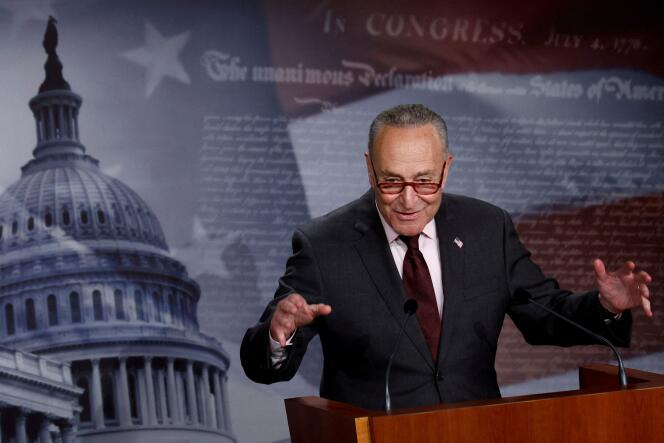
It’s the surprise of August. Less than 100 days before the midterm elections, the Senate was on its way to adopting the inflation bill on Sunday, August 7, a lighter version of Joe Biden’s Build Back Better plan, which has remained a dead letter for a while. year for lack of agreement between the Democrats. An unexpected success for a party that could no longer ward off the specter of defeat predicted by the polls for the November 8 election.
Early in the afternoon, Saturday August 6, Senator Chuck Schumer, leader of the Democrats, introduced the text, renamed the Inflation Reduction Act. This contains advances “historical”he set out: lower drug prices for the elderly, unprecedented investments in climate defense and green energy, higher taxes for large companies to finance social and environmental measures while reducing the deficit .
The senator announced that the last obstacles had been removed so that the text could be adopted by a simple majority. A few hours earlier, the procedural rules arbitrator, the « Parliamentarian » Elizabeth MacDonough, had approved the use of the so-called “reconciliation” process. This makes it possible to circumvent the use of filibuster (the obstructionist maneuver that requires 60 votes to break) when the measures contained are of a budgetary nature. In the 725 pages, the official censored only one element: the article which provided that pharmaceutical companies reimburse private insurance companies if their prices increase faster than inflation.
At the end of the afternoon, then began what the political class has taken to calling « vote-a-rama » : the unlimited introduction of amendments. The objective being to delay the inevitable: with 50 votes, plus that of Vice-President Kamala Harris, the Democrats have a sufficient majority to snatch the passage of the law. Provided, however, that no elected official is missing due to Covid-19. On this subject, the Republicans have accused the Democratic leadership of having adopted a policy of « no test, no questions » to prevent any absence, in defiance of the safety of their colleagues.
The preliminary vote, on the motion to proceed with the consideration of the text, took place at 7:30 p.m. The motion passed thanks to the vote of Kamala Harris who decided the tie 50-50. Deliberations were able to begin on the substance of the text.
First to intervene, Bernie Sanders, the progressive senator from Vermont, dampened the enthusiasm of his Democratic friends. While they had silenced their differences and decided not to present any amendments, he took the risk of reopening the wounds by proposing to the 50 Democrats to take advantage of their majority to vote for a much more ambitious text. Feeding the Republican mill, he even judged that “the so-called Inflation Reduction Act” would only have one “minimal impact on inflation”. In the name of the rediscovered unity, a dozen senators let it be known that they would not vote for any of his amendments, even if they agreed on the substance.
You have 66.28% of this article left to read. The following is for subscribers only.
–

